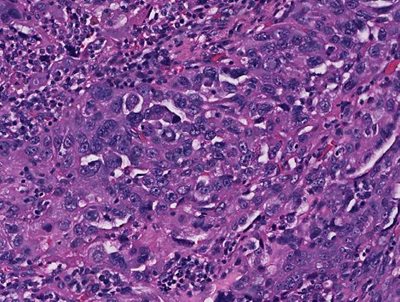Overview
 Ovarian Cancer Cells
Ovarian Cancer Cells
Outcomes for women with ovarian cancer are slowly improving but the 5-year survival-rate is still only ~40%.
One barrier to improving outcomes is that ovarian cancer is currently treated as a single disease. We now understand that ovarian cancer is a complex, diverse disease comprising multiple distinct subtypes that vary considerably in their biological behaviour and response to standard treatments.
INOVATe (Individualised Ovarian Cancer Treatment Through Integration of Genomic Pathology into Multidisciplinary Care) is a research study that has been established to develop strategies to better define ovarian cancer patient subsets, based on tumour genomic profiling in conjunction with conventional histological subtyping, in an effort to optimise the selection of patients for novel molecularly-targeted clinical trials and ultimately to individualise treatment.
INOVATe is a multicentre, collaborative program that is open at 13 study sites across Sydney, including:
Led by Professor Anna deFazio, University of Sydney Chair of Translational Cancer Research, the program involves teams of researchers from the:
The study involves the collection of cancer tissue and blood samples from women diagnosed with ovarian cancer, along with detailed clinical data relating to their cancer diagnosis and treatment. Molecular profiling of the cancer tissue and correlation with clinical data will allow researchers to better understand the characteristics of ovarian cancer at diagnosis and also to understand changes that may occur over time.
A newly established Molecular Tumour Board and an online portal for the visualisation of molecular profiling results will enhance the multidisciplinary team’s ability to tailor treatment to suit the individual patient based on the molecular characteristics of their cancer cells.
The INOVATe program has been funded by Translational Program Grants from the Cancer Institute NSW and Cancer Council NSW.
Aims
The overarching goal of this research is to develop a personalised approach to the management of women with ovarian cancer based on genomic profiles of their tumours, and by using this information to incorporate novel therapeutic opportunities and new molecular targeted agents.
In this program, the processes will be developed for intensive molecular testing on primary tumours, samples collected at relapse (ascites and biopsies) and circulating tumour DNA. Genomic biomarkers to predict treatment response will be assessed and molecular testing will be used to assist in the selection of patients for clinical trials of targeted agents.
The specific aims of this program are:
- To integrate molecular pathology into current models of multidisciplinary care.
- To develop a framework for optimising patient management based on the premise that ‘ovarian cancer’ comprises a number of rare and distinct tumour subtypes rather than being a single disease entity.
- To facilitate the pipeline of novel therapies and more rational treatment recommendations, which are key to making progress in ovarian cancer.